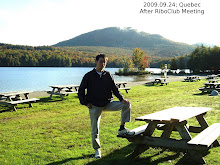Blogs and tweets are ripping papers apart within days of publication, leaving researchers unsure how to react.Specifically, two widely publicized papers in Science are singled out: one is about the longevity genes identified through genome-wide association study (GWAS), published last July; another is a more recent one on arsenic bacteria, published last December. In each case, while "the popular media was trumpeting the finding, other researchers were taking to the web to criticize the paper’s methodology." Yet, the authors failed to hold up their claims in the papers.
With great interest, I've been following the story on arsenic bacteria. I first noticed this work through Science Podcast, and found the topic of "arsenic" life intriguing. So for general knowledge, I read carefully the abstract and browses through the text. One week later came the Nature editorial "Response required", and from which, I followed the link to Rosie Redfield's blog post "Arsenic-associated bacteria (NASA's claims)". I read the post, and many of the comments therein; while I do not understand many of the technical details, I had no difficulty in following her argument. The lead author of the arsenic bacteria paper, Dr. Felisa Wolfe-Simon, did respond to comments on December 16, 2010. Science also published an interview with Wolfe-Simon, titled "Discoverer Asks for Time, Patience Over Arsenic Bacteria Controversy". On the same day, Redfield was quick to write another blog post "Comments on Dr. Wolfe-Simon's Response", which again has received many comments. So far, the story is still unfolding, and Science has promised to publish technical comments and responses in early 2011.
As a related topic, throughout the CCP4bb, I noticed the letter to editor titled "Is too ‘creative’ language acceptable in crystallography?" by Alexander Wlodawer et al. I agree fully with the authors that "While figures of speech are often useful and even educational, flashy titles combined with hyperbolae and imprecise language can mislead or deceive nonspecialist readers and should therefore be avoided."
In the Internet Age, bloggers and tweeters clearly have an important role to play in the assessment of research findings. In scientific publications, what counts is not how much one claims, but to what extent one can hold up such claims. Solid work holds up over time and the scrutiny of peers.

No comments:
Post a Comment
You are welcome to make a comment. Just remember to be specific and follow common-sense etiquette.